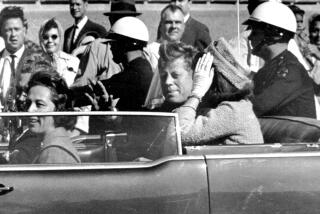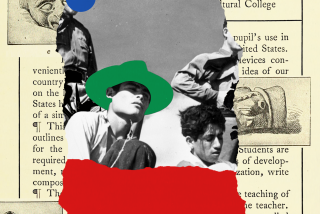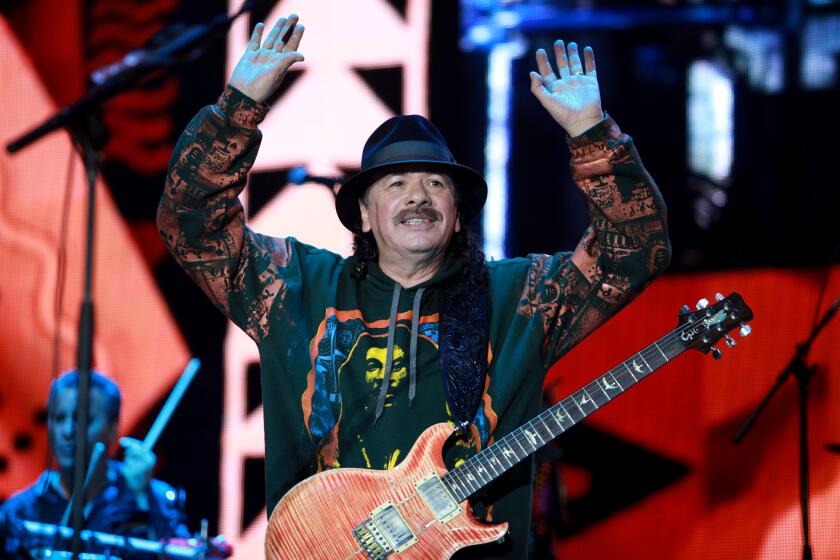Review: American history, as Oliver Stone sees it
- Share via
Had Oliver Stone not been involved in “Oliver Stone’s Untold History of the United States,” which premieres Monday night on Showtime, would the 10-part miniseries have a less hectoring tone? Would voices of actual historians replace clips from Frank Capra and John Wayne movies to make points of fairly grave significance?
And perhaps most important, without the regular use of histrionic questions such as these, would the essentially reasonable warning against American nationalist preening have been less condescending and therefore more convincing?
History will never know.
PHOTOS: When directors change up their genre
“Oliver Stone’s Untold History of the United,” based on the book cowritten by Stone and Peter Kuznick, an associate professor of history at American University, plays precisely as the title suggests — a version of events curated by the controversial writer-director. It opens with Stone explaining that his shock over the simplistic version of America being taught in school moved him to make this series, so his children would have access to something “that looks beyond what I call the tyranny of ‘now.’” He would tell the American story in a way “it had never been told before.”
But the story of how the United States’ actions, at home or abroad, have not always been noble or smart or superior to those of other nations is not quite as untold as Stone believes. That, for example, it was the Soviet army rather than the Americans that turned the tide of World War II has been dealt with in several fairly recent documentaries. That President Harry S. Truman’s decision to drop the atomic bomb on Hiroshima had as much if not more to do with establishing America’s dominance in the postwar politics than ending the war with Japan is something that activists, politicians and historians have discussed virtually from the moment he made it.
Narrated by Stone with no other voices (save actors filling in for various world leaders), “Untold History” is a hodgepodge of terrific if often disturbing historical footage and bizarre theatrical asides (including, at one point, the dictionary definition of “empathy” spelled out on the screen) that are almost overwhelmed by its invasive soundtrack. It seems, more than anything, a response to the notion of “American exceptionalism,” though it’s difficult to imagine that those Americans who do believe, as Stone puts it, that America is the center of the universe and always the good guy, will be swayed by him.
PHOTOS: Celebrities by the Times
Which is not to say that there isn’t value in the series. History demands constant reevaluation and certainly it is important to be reminded that the actions of our government can be tragically flawed. There are wonderful pieces of footage here and vivid glimpses of behind-the-scenes politicking, particularly regarding Franklin Delano Roosevelt’s second vice president, Henry Wallace, a progressive liberal Roosevelt fought to get on the ticket, only to have him replaced by conservative forces during his fourth and final term by Truman. In early episodes, Wallace returns to Stone’s narrative again and again as a lost hope for America, a man who might have saved us from the sins of the atomic age.
Not every historian sees Wallace as quite the tragic hero Stone considers him, but the narrative of “The Untold History” is too often just as one-note as the versions Stone seeks to replace. Indeed, the inclusion, at several points, of clips from Capra’s “Mr. Smith Goes to Washington” is as telling as it is narratively jarring. Stone presents his case with little recognition of the social, political and psychological complexities that dominate much of human development, turning it, intentionally or not, into an alternative mythology that relies far more on broad-stroke storytelling than rigorous analysis.
And isn’t that what he was angry about in the first place?
----------------------------------------
‘Untold History of the United States’
Where: Showtime
When: 8 p.m. Monday
Rating: TV-14-V (may be unsuitable for children under the age of 14 with an advisory for violence)
PHOTOS, VIDEOS & MORE:
Timeline: Emmy winners through the years
Celebrity meltdowns
VIDEO: Watch the latest fall TV trailers here
More to Read
The biggest entertainment stories
Get our big stories about Hollywood, film, television, music, arts, culture and more right in your inbox as soon as they publish.
You may occasionally receive promotional content from the Los Angeles Times.











